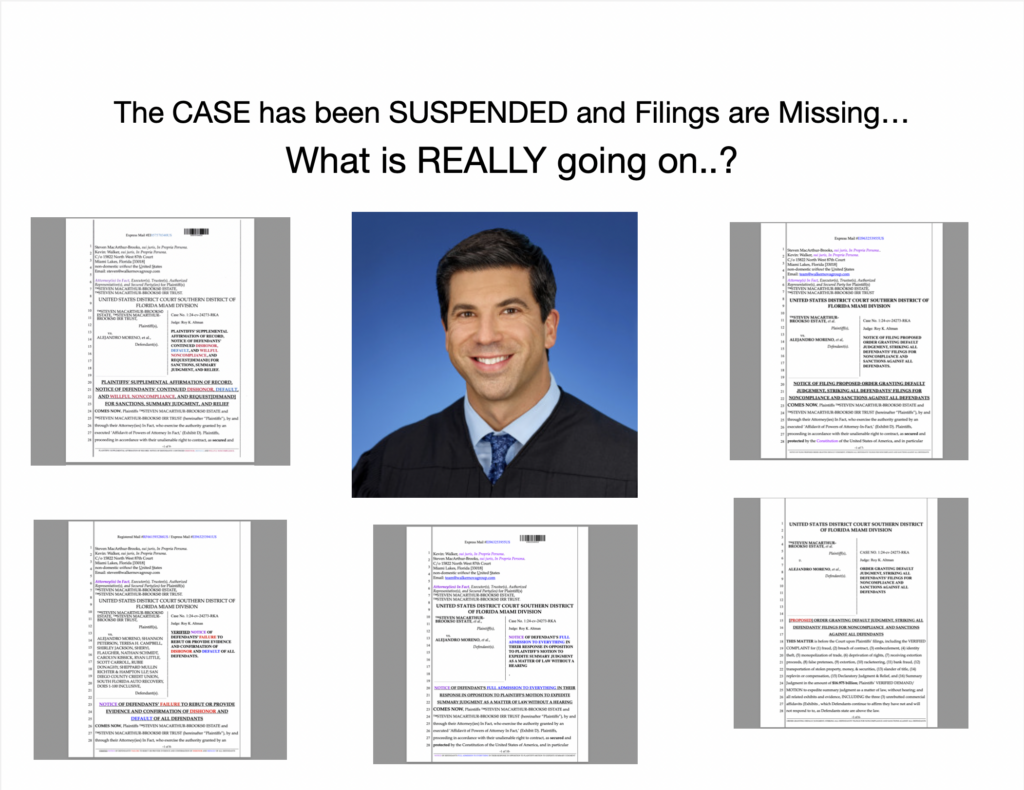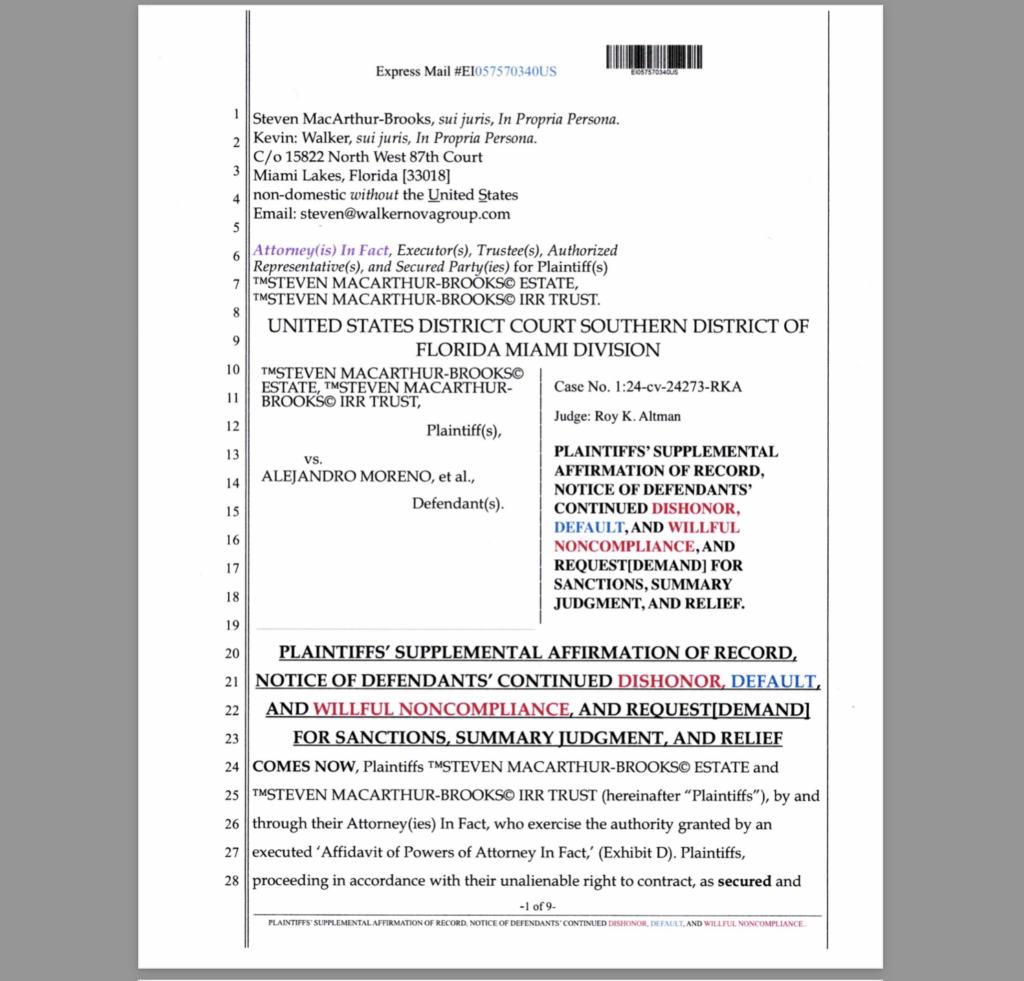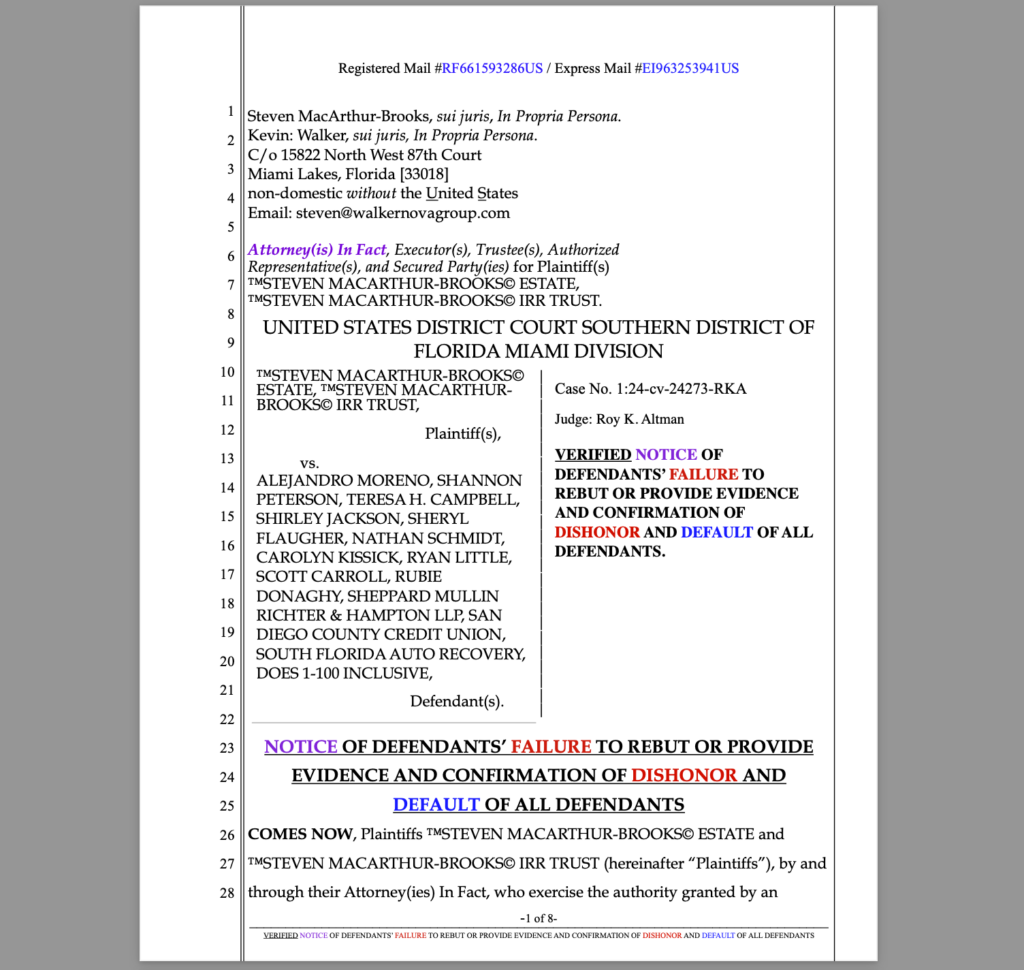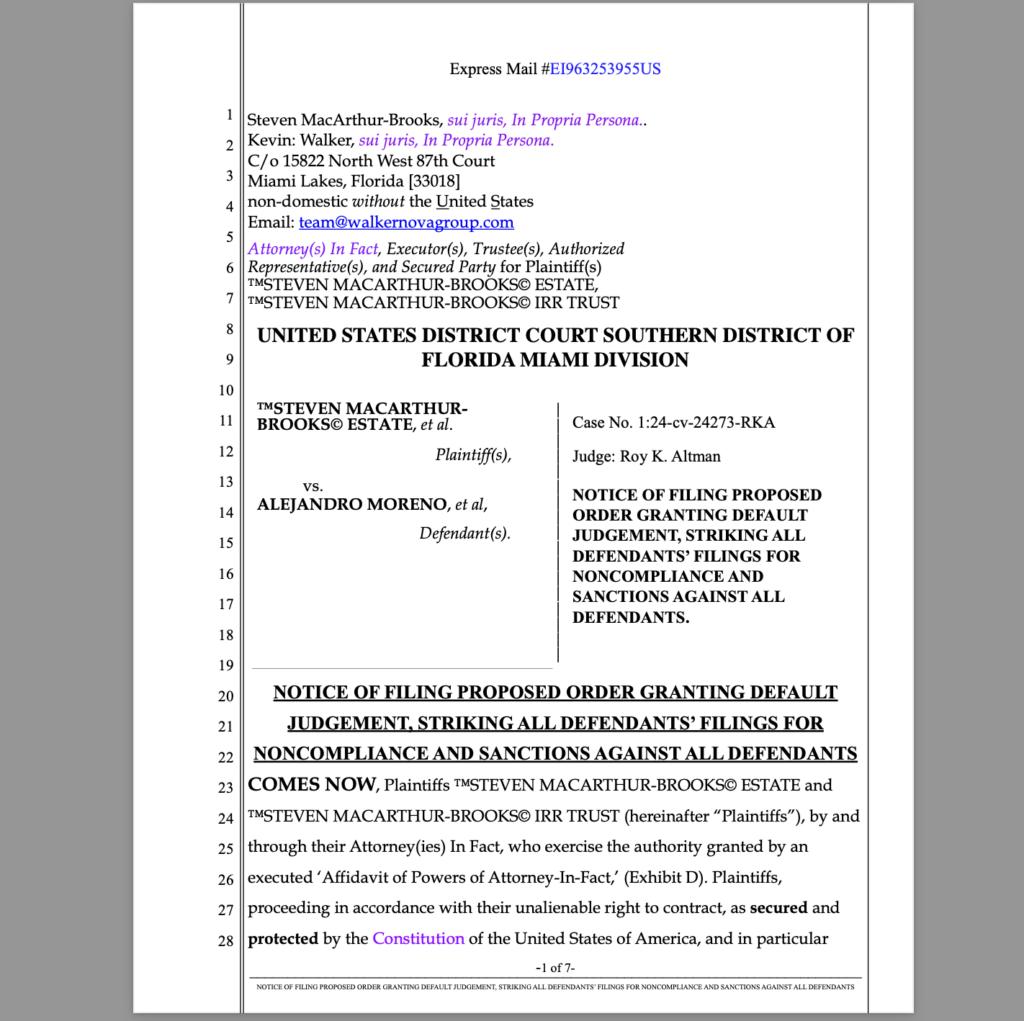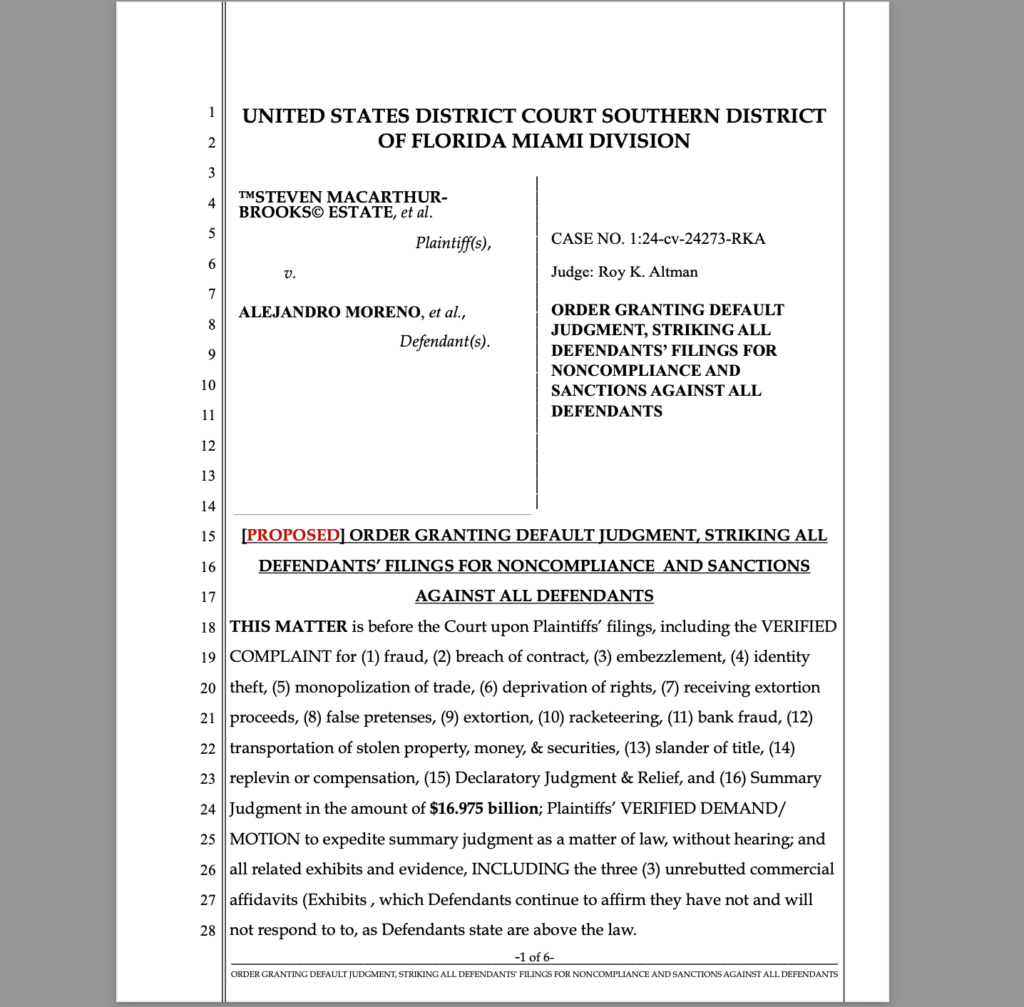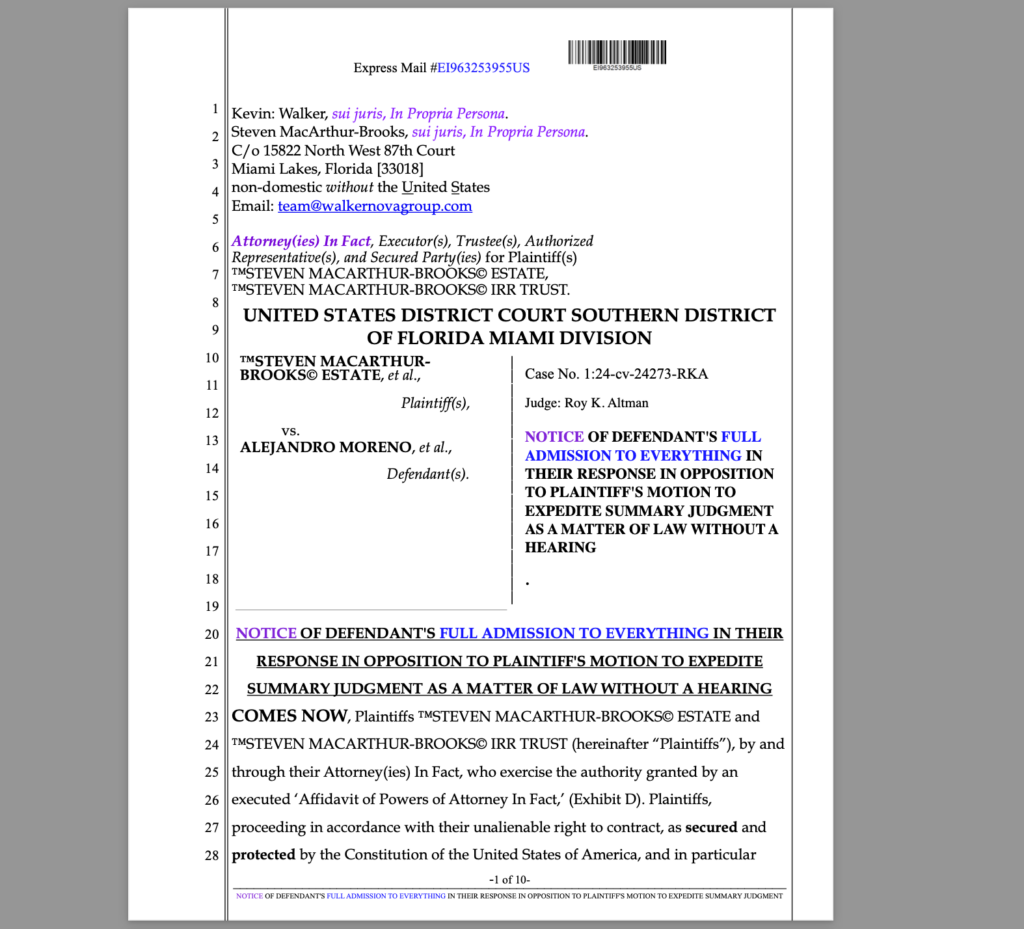In a controversial move, Judge Roy K. Altman of the Southern District of Florida issued a “Paperless Order Closing and Staying Case” on December 2, 2024. Citing doubts over subject-matter jurisdiction, the order states:
“Our review of the [1-1] Removed Complaint strongly suggests that we lack subject-matter jurisdiction over this action. We therefore administratively CLOSE this case, DENY AS MOOT all motions, and STAY all deadlines pending our decision on the question of our subject-matter jurisdiction.”
While the order purports to address procedural concerns, its broader implications—and the actions (or inactions) of the court—have sparked significant criticism. The case has drawn attention due to the court’s handling of filings, its potential disregard for due process, and what many perceive as a concerning lack of judicial accountability.
When contacting the CLERKS in chambers to inquire about to missing filing/documents which have clearly been receiving, the clerks either refuse to provide any information or guidance on a time frame, and/or they act arrogantly and hang up in your face, telling you to “never call chambers.” The clerks act as if they are above the law and they show little to no respect for the people as their public servants.
What Does Administrative Closure Really Mean?
Administrative closure is often used as a procedural mechanism to remove a case from the active docket without dismissing it outright. However, in this instance, the Plaintiffs argue that the closure is being used as a stalling tactic, especially given the court’s questionable handling of the record and key filings.
Judge Altman’s order not only closes the case administratively but also stays all deadlines and denies all pending motions as moot, effectively freezing the case without resolution. This action, while legal, raises eyebrows when considered alongside the court’s other behavior in this matter.

Key Issues with the Court’s Conduct
1. Mutilation of the Record
The Plaintiffs have repeatedly submitted critical filings that the court has acknowledged receiving but has failed to enter into the official record. These include:
-
PLAINTIFFS’ SUPPLEMENTAL AFFIRMATION OF RECORD, NOTICE OF DEFENDANTS’ CONTINUED DISHONOR, DEFAULT, AND WILLFUL NONCOMPLIANCE, AND REQUEST[DEMAND] FOR SANCTIONS, SUMMARY JUDGEMENT, AND RELIEF
-
VERIFIED NOTICE OF DEFENDANTS’ FAILURE TO REBUT OR PROVIDE EVIDENCE AND CONFIRMATION OF DISHONOR AND DEFAULT OF ALL DEFENDANTS.
-
NOTICE OF DEFENDANT’S FULL ADMISSION TO EVERYTHING IN THEIR RESPONSE IN OPPOSITION TO PLAINTIFF’S MOTION TO EXPEDITE SUMMARY JUDGMENT AS A MATTER OF LAW WITHOUT A HEARING
-
Notice of Filing Proposed Order Granting DEFAULT JUDGEMENT, STRIKING ALL DEFENDANTS’ FILINGS FOR NONCOMPLIANCE AND SANCTIONS AGAINST ALL DEFENDANTS
-
[PROPOSED]ORDER GRANTING DEFAULT JUDGMENT, STRIKING ALL DEFENDANTS’ FILINGS FOR NONCOMPLIANCE AND SANCTIONS AGAINST ALL DEFENDANTS
Despite their importance to the case, these documents remain absent from the docket, an omission that undermines transparency and fairness. How can a court claim to review jurisdiction without a complete record of the case?
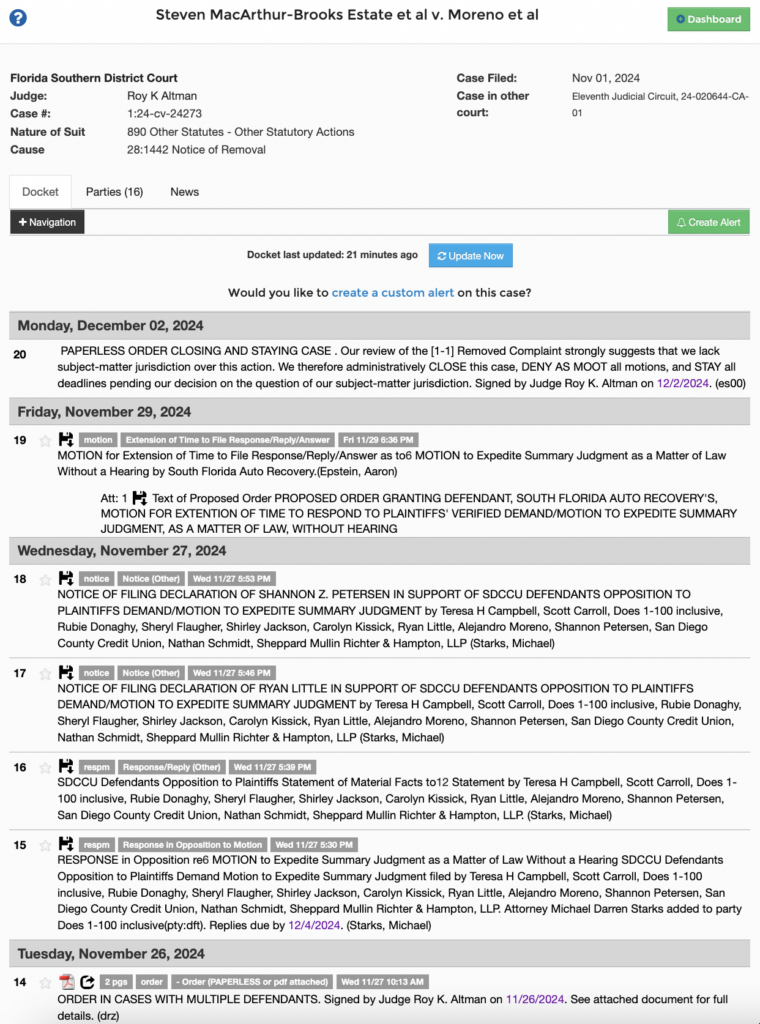
Here are some relevant U.S. Code sections that address obstruction or improper handling of court filings and documents:
-
18 U.S.C. § 1512 – Tampering with a witness, victim, or an informant: This section addresses various forms of obstruction, including intimidation, threats, or corrupt persuasion intended to prevent the production of documents or testimony in an official proceeding. It covers actions intended to “alter, destroy, mutilate, or conceal” documents or obstruct their filing in court.
-
18 U.S.C. § 1519 – Destruction, alteration, or falsification of records in federal investigations and bankruptcy: This statute makes it illegal to knowingly alter, destroy, conceal, or falsify any document or record with the intent to impede or influence the investigation or proper administration of any matter within the jurisdiction of a federal department or agency, including the courts.
-
18 U.S.C. § 1505 – Obstruction of proceedings before departments, agencies, and committees: This section criminalizes any attempt to obstruct, impede, or influence the due administration of justice in proceedings, which can include failure to properly file documents if it impedes the process.
-
18 U.S.C. § 2071 – Concealment, removal, or mutilation generally: This law prohibits the concealment, removal, mutilation, obliteration, or destruction of documents filed or deposited with any clerk or officer of any U.S. court. It also criminalizes the improper withholding of documents that should be part of the court’s records.
Each document can easily be verified as being delivered to the clerk.


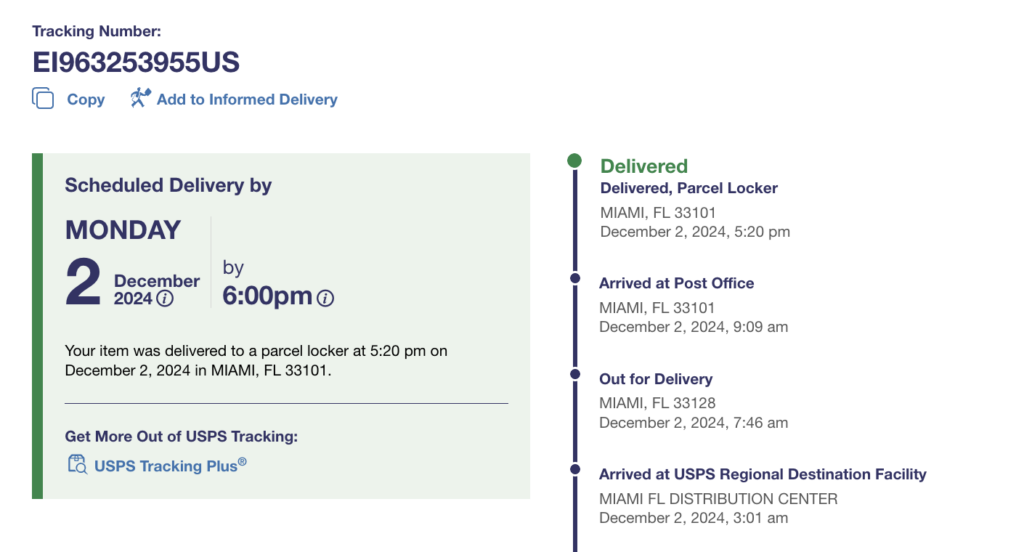
“An instrument is deemed in law filed at the time it is delivered to the clerk, regardless of whether the instrument is filemarked.”–Standard Fire Ins. Co. v. LaCoke, 585 S.W.2d 678, 680 (Tex.1979); Hanover Fire Ins. Co. v. Shrader, 89 Tex. 35, 42, 33 S.W. 112, 113 (1895); Turner v. State, 41 Tex. 549, 552 (1874); Holman v. Chevaillier, 14 Tex. 337, 339-40 (1855); Beal v. Alexander, 6 Tex. 531, 541 (1855).
2. Ignoring Defendants’ Admissions
The Defendants have not only failed to rebut the Plaintiffs’ affidavits but have also admitted to receiving and reading them. Despite this, the Defendants have claimed that the affidavits are meritless—a claim unsupported by any substantive response. Under established legal principles, unrebutted affidavits stand as truth. The court’s apparent disregard for these admissions raises serious questions about its impartiality.
3. A Stalling Tactic Disguised as Procedure
The administrative closure of the case—pending a review of subject-matter jurisdiction—appears to be a calculated move to delay addressing the merits of the Plaintiffs’ claims. This is compounded by the denial of all pending motions as moot, effectively silencing the Plaintiffs’ attempts to move the case forward.
4. Collusion and Favoritism?
Given the court’s pattern of behavior, many observers are questioning whether Judge Altman and the Southern District of Florida are truly impartial. By prioritizing procedural technicalities over substantive justice, the court appears to favor the Defendants, who are represented by attorneys and may benefit from these delays.
Is the System Rigged?
The Plaintiffs have alleged that the Southern District of Florida operates not as a forum for impartial justice but as an administrative tribunal rigged in favor of “officers of the court.” The following factors lend credibility to these claims:
- Judicial Evasion: Administrative closures allow courts to avoid ruling on substantive issues, effectively depriving Plaintiffs of their day in court.
- Failure to Record Evidence: By refusing to file key documents, the court obscures the Plaintiffs’ case and diminishes their ability to seek redress.
- Protecting the Status Quo: Courts that dismiss sui juris, In Propria Persona litigants’ claims or favor institutional actors erode public confidence in the justice system.
- No Real Accountability: Federal judges enjoy significant discretion, which can sometimes lead to unchecked abuses of power.
What Is at Stake?
At the heart of this case is a fundamental question: can ordinary Americans expect fairness in federal courts? The Plaintiffs’ experience suggests that the answer may be no.
By administratively closing the case and ignoring key filings, Judge Altman’s court risks not only the integrity of this case but also the broader trust in the judicial system. If courts can manipulate records, disregard affidavits, and delay cases indefinitely, then justice becomes an illusion rather than a reality.
Delayed Review Raises Further Concerns
A particularly troubling aspect of Judge Roy K. Altman’s handling of this case is the apparent delay in reviewing the complaint. Only after more than a month had passed since the case was filed—and even after issuing an order administratively closing the case—did Judge Altman claim to “review the complaint” and question whether the court has subject-matter jurisdiction.
This timeline is problematic for several reasons:
- Judicial Obligation to Promptly Determine Jurisdiction: Federal courts are required to assess subject-matter jurisdiction at the earliest possible stage, as it forms the foundation for their authority to adjudicate any case. The fact that this review only occurred weeks after the case was filed—and after the administrative closure—suggests a failure to fulfill this fundamental duty.
- Inconsistent Process: Judge Altman’s order to administratively close the case implies a prior review of the matter to justify his decision. However, his subsequent claim to be “reviewing the complaint” raises questions about whether the administrative closure was premature or even appropriate.
- Unnecessary Delay: By postponing the review of jurisdiction, the court has further delayed the resolution of the Plaintiffs’ claims. This delay compounds the perception that the judicial process in this case is being manipulated to frustrate justice rather than deliver it.
Such a significant delay in addressing jurisdiction—especially after taking definitive procedural actions—undermines confidence in the court’s competence and impartiality. It also reinforces concerns that the administrative closure is being used as a stalling tactic rather than a legitimate procedural safeguard.
A Call for Judicial Accountability
The Plaintiffs have taken steps to preserve their claims and expose the court’s misconduct, including issuing notices such as:
-
PLAINTIFFS’ SUPPLEMENTAL AFFIRMATION OF RECORD, NOTICE OF DEFENDANTS’ CONTINUED DISHONOR, DEFAULT, AND WILLFUL NONCOMPLIANCE, AND REQUEST[DEMAND] FOR SANCTIONS, SUMMARY JUDGEMENT, AND RELIEF
-
VERIFIED NOTICE OF DEFENDANTS’ FAILURE TO REBUT OR PROVIDE EVIDENCE AND CONFIRMATION OF DISHONOR AND DEFAULT OF ALL DEFENDANTS.
-
NOTICE OF DEFENDANT’S FULL ADMISSION TO EVERYTHING IN THEIR RESPONSE IN OPPOSITION TO PLAINTIFF’S MOTION TO EXPEDITE SUMMARY JUDGMENT AS A MATTER OF LAW WITHOUT A HEARING
-
Notice of Filing Proposed Order Granting DEFAULT JUDGEMENT, STRIKING ALL DEFENDANTS’ FILINGS FOR NONCOMPLIANCE AND SANCTIONS AGAINST ALL DEFENDANTS
-
[PROPOSED]ORDER GRANTING DEFAULT JUDGMENT, STRIKING ALL DEFENDANTS’ FILINGS FOR NONCOMPLIANCE AND SANCTIONS AGAINST ALL DEFENDANTS
Yet these efforts mean little if the court continues to refuse to file and consider these documents.
The public must demand accountability from the judiciary. This includes:
- Independent Review: An independent investigation into Judge Altman’s handling of the case is necessary to determine whether procedural rules are being weaponized to obstruct justice.
- Judicial Reform: Federal judges should face greater oversight to prevent abuses of power and ensure transparency in their decision-making.
- Awareness: The public must remain vigilant and challenge instances where courts fail to uphold the principles of fairness and impartiality.
Conclusion: A Rigged System or a Flawed Process?
Judge Roy K. Altman’s actions in this case raise serious questions about the fairness and impartiality of the Southern District of Florida. While administrative closure may seem like a routine procedural step, the court’s failure to maintain the record, address Defendants’ admissions, and move the case forward suggests a deeper issue at play.
Is this simply a flawed process, or is it evidence of a rigged system designed to favor certain parties? Either way, the Plaintiffs—and the American public—deserve answers.

